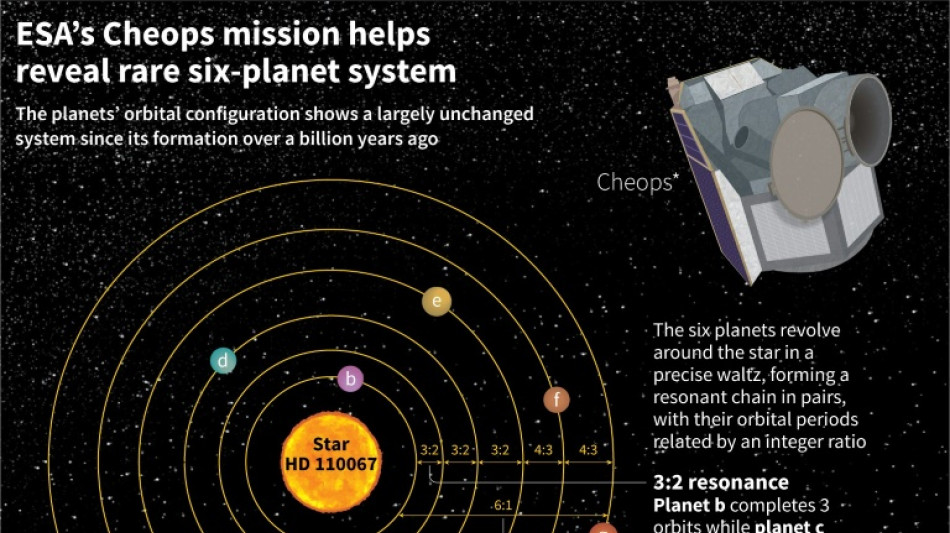
-
 Shares in 'Baby Shark' studio jump on market debut
Shares in 'Baby Shark' studio jump on market debut
-
Thunder breeze past Pelicans, Pistons overpower Pacers

-
 Grieving Cowboys remember Kneeland, defeat Raiders
Grieving Cowboys remember Kneeland, defeat Raiders
-
Loaf behind bars: Aussie inmate says Vegemite a human right

-
 In film's second act, 'Wicked' goes beyond Broadway musical
In film's second act, 'Wicked' goes beyond Broadway musical
-
Asian markets track Wall St down with Nvidia, US jobs in view
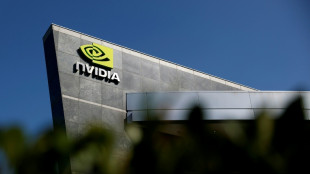
-
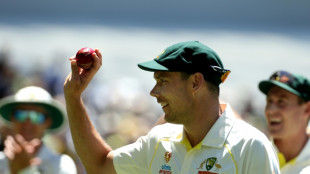 Scott Boland: the best 'spare' fast bowler around
Scott Boland: the best 'spare' fast bowler around
-
Fire and Ashes: England bank on fast bowling barrage in Australia

-
 North Korea says Seoul-US sub deal will trigger 'nuclear domino' effect
North Korea says Seoul-US sub deal will trigger 'nuclear domino' effect
-
Education for girls hit hard by India's drying wells

-
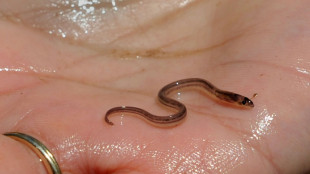 Haitian gangs getting rich off murky market for baby eels
Haitian gangs getting rich off murky market for baby eels
-
Trump says will talk to Venezuela's Maduro, 'OK' with US strikes on Mexico

-
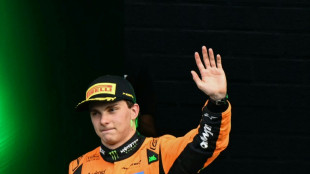 Oscar Piastri wins Australia's top sports honour
Oscar Piastri wins Australia's top sports honour
-
'Severely restricted': Russia's Saint Petersburg faces cultural crackdown

-
 Polish PM denounces 'sabotage' of railway supply line to Ukraine
Polish PM denounces 'sabotage' of railway supply line to Ukraine
-
UK toughens asylum system with radical overhaul

-
 Carney's Liberals pass budget, avoiding snap Canada election
Carney's Liberals pass budget, avoiding snap Canada election
-
LeBron back in training, edges closer to Lakers return

-
 Climate talks run into night as COP30 hosts seek breakthrough
Climate talks run into night as COP30 hosts seek breakthrough
-
Germany and Netherlands lock up World Cup spots in style

-
 Germany's Woltemade hopes for 2026 World Cup spot after scoring again
Germany's Woltemade hopes for 2026 World Cup spot after scoring again
-
Germany 'send message' with Slovakia rout to reach 2026 World Cup

-
 Trump unveils fast-track visas for World Cup ticket holders
Trump unveils fast-track visas for World Cup ticket holders
-
Netherlands qualify for World Cup, Poland in play-offs

-
 Germany crush Slovakia to qualify for 2026 World Cup
Germany crush Slovakia to qualify for 2026 World Cup
-
Stocks gloomy on earnings and tech jitters, US rate worries

-
 'In it to win it': Australia doubles down on climate hosting bid
'In it to win it': Australia doubles down on climate hosting bid
-
Former NFL star Brown could face 30 yrs jail for shooting case: prosecutor

-
 Fate of Canada government hinges on tight budget vote
Fate of Canada government hinges on tight budget vote
-
New research measures how much plastic is lethal for marine life

-
 Mbappe, PSG face off in multi-million lawsuit
Mbappe, PSG face off in multi-million lawsuit
-
EU defends carbon tax as ministers take over COP30 negotiations

-
 McCartney to release silent AI protest song
McCartney to release silent AI protest song
-
Stocks tepid on uncertainty over earnings, tech rally, US rates

-
 Louvre shuts gallery over ceiling safety fears
Louvre shuts gallery over ceiling safety fears
-
'Stranded, stressed' giraffes in Kenya relocated as habitats encroached

-
 US Supreme Court to hear migrant asylum claim case
US Supreme Court to hear migrant asylum claim case
-
Western aid cuts could cause 22.6 million deaths, researchers say

-
 Clarke hails Scotland 'legends' ahead of crunch World Cup qualifier
Clarke hails Scotland 'legends' ahead of crunch World Cup qualifier
-
S.Africa says 'suspicious' flights from Israel show 'agenda to cleanse Palestinians'

-
 South Korea pledges to phase out coal plants at COP30
South Korea pledges to phase out coal plants at COP30
-
Ex-PSG footballer Hamraoui claims 3.5m euros damages against club

-
 Mbappe, PSG in counterclaims worth hundreds of millions
Mbappe, PSG in counterclaims worth hundreds of millions
-
Two newly discovered Bach organ works unveiled in Germany

-
 Stocks lower on uncertainty over earnings, tech rally, US rates
Stocks lower on uncertainty over earnings, tech rally, US rates
-
Barca to make long-awaited Camp Nou return on November 22

-
 COP30 talks enter homestretch with UN warning against 'stonewalling'
COP30 talks enter homestretch with UN warning against 'stonewalling'
-
France makes 'historic' accord to sell Ukraine 100 warplanes

-
 Delhi car bombing accused appears in Indian court, another suspect held
Delhi car bombing accused appears in Indian court, another suspect held
-
Emirates orders 65 more Boeing 777X planes despite delays


Six exoplanets discovered in synchronised dance around star
Six exoplanets have been spotted in a perfectly synchronised dance around a nearby star, offering clues about the formation of our own Solar System, astronomers said on Wednesday.
The six planets orbit the bright star HD 110067 around 100 light years away from Earth. The star is visible from the Northern Hemisphere as part of the Coma Berenices constellation.
The planets are so close to their star that all six would all fit into the orbit of Mercury and our Sun, Adrien Leleu, a researcher at the University of Geneva, told AFP.
All of the very hot planets are somewhere between the size of Earth and Neptune, said Leleu, the co-author of a new study published in the journal Nature.
All six have a similar make-up to Neptune -- "a rocky body covered with a thick envelope of gas," he added.
None of these "sub-Neptunes" are thought to be far away enough from their star to host liquid water, a key ingredient for supporting life.
While not habitable, they are remarkable in another way: all six planets are precisely synchronised with each other in their orbit.
NASA's Transiting Exoplanet Survey Satellite (TESS) first discovered two exoplanets orbiting the star in 2020.
The satellite, known as the exoplanet hunter, spotted the pair by measuring the change in brightness when they passed over their host star.
The planet closest to the star orbits around it in just nine days.
However there were some indications that other planets could be passing over the star, which astronomers suspected were orbiting over a longer period.
HESS is designed to scan the sky for a few weeks, so was not the best hunter for planets with longer orbits.
So the European Space Agency's Cheops satellite, which can target a star for much longer, was brought into the chase.
Over time, Cheops managed to spot four more planets.
- In lockstep -
The planets carry out a delicate dance called "orbital resonance" in which the gravity of each keeps the others in rhythm.
In the time that the first planet carries out three trips around its star, the second planet does two revolutions. When the second planet goes around three times, the third planet has done two orbits, and so on.
The last planet completes one orbit in the time it takes the first to do six -- proof that they are all connected by a "resonance chain," Leleu said.
More than 5,000 exoplanets, planets outside our Solar System, have been discovered since the first was spotted in 1995 -- but this system is the first to have so many planets acting in such harmony.
But in theory this is how all planets start off, said the study's lead author Rafael Luque of the University of Chicago.
The HD 110067 system is believed to have remained virtually unchanged since its birth at least four billion years ago.
However the planets of our home Solar System, which is not much older, do not orbit in sync, Leleu said.
This could be because of "frequent chaotic events" after the birth of the Solar System, such as the formation of giant plants like Jupiter and Saturn, which could have destabilised the orbits of the smaller planets, Luque said.
It also could have been because of some giant meteorite, he added.
The astronomers hope that the new system will help understand the history of our Solar System -- and how it lost its rhythm.
C.Hamad--SF-PST




